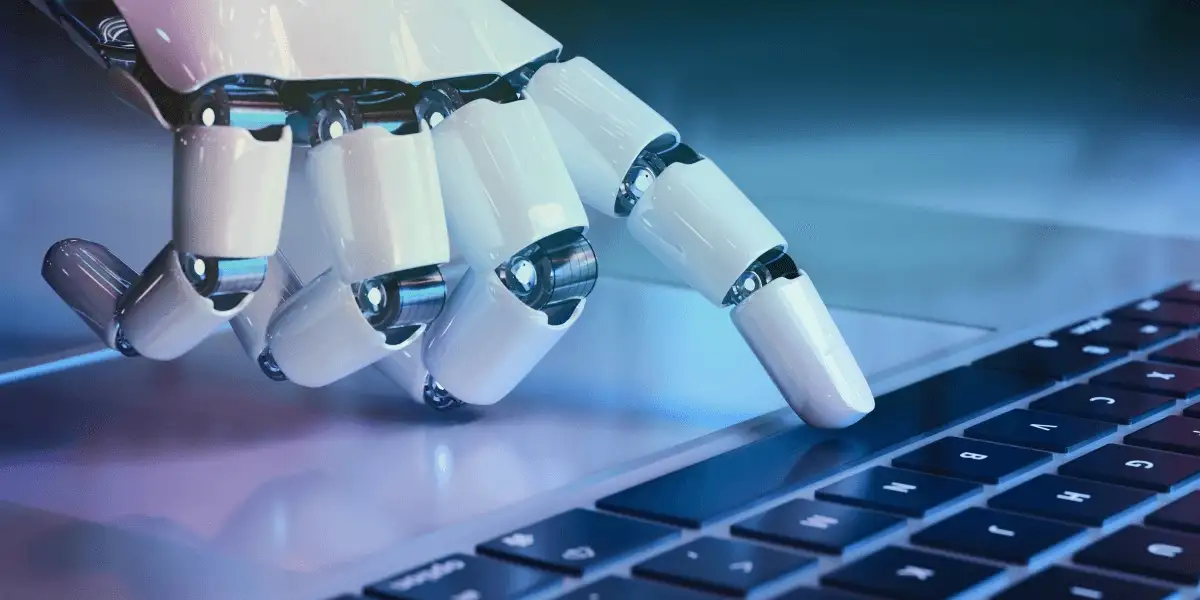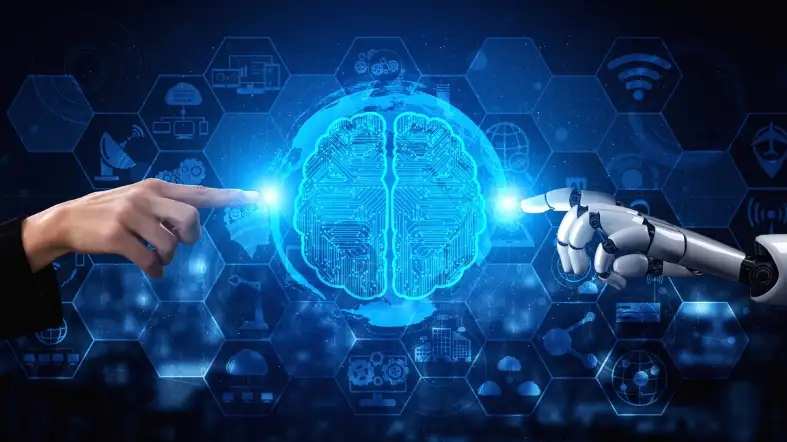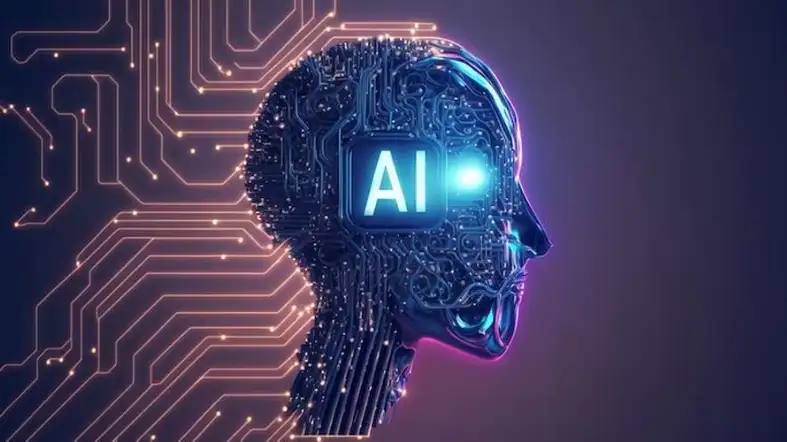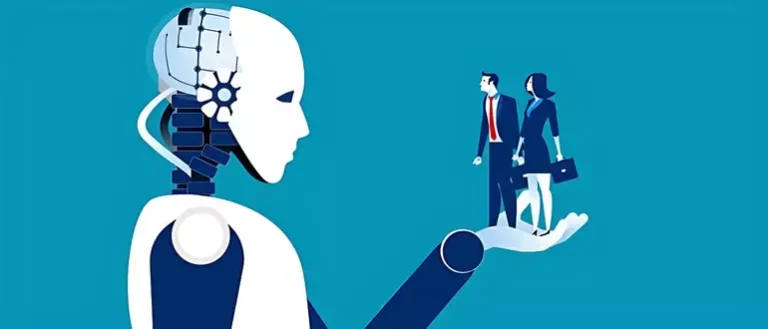DevOps continues to be essential in bridging the gap between development and operations, even though there is little doubt that AI is revolutionizing how businesses approach software development and delivery.
This blog post will explore the impacts of the AI job sector of DevOps, will see some examples of AI integration in this field, limitations of AI, and the required skills as a DevOps engineer to stay relevant in the age of AI.

Will AI Replace DevOps?
No, AI cannot fully replace DevOps. While it can assist in automating tasks such as testing and monitoring, DevOps is a culture and set of practices that require human collaboration and decision-making to ensure successful outcomes.
AI and DevOps can work together to enhance the development and operations process, but they can only replace each other partially.
What Are Some Examples Of Successful AI Integration In DevOps?
Using AI to Power Content Personalization
Netflix is an excellent example of how AI can be used to personalize content.
The company uses Spark, an open-source big data processing engine, to power content personalization.
Netflix continually tests new models and hypotheses to improve existing models.
Before implementing a new model, it is tested against an older model and proven to be better.
By incorporating AI in content personalization, DevOps teams can enhance the user experience and improve customer satisfaction.
Incorporating Machine Learning Frameworks
Machine learning frameworks like TensorFlow, PyTorch, and sci-kit-learn provide libraries and APIs for building and training AI models for predictive analytics, anomaly detection, and natural language processing tasks.
DevOps teams can use these frameworks to develop intelligent systems that automate repetitive tasks and improve decision-making capabilities.
Leveraging AI for Better Data Access
DevOps teams can use AI to compile data from various sources and organize it cohesively to improve collaboration and efficiency.
AI can analyze data more effectively, making data-driven decisions easier.
This approach also provides teams with real-time data access, ensuring they have the most up-to-date information available.
Utilizing Automation for Continuous Deployment
Continuous deployment allows teams to release new or updated software quickly.
It is ideal for DevOps teams with a fast development lifecycle, such as those building e-commerce sites and SaaS platforms.
By using automation, teams can speed up the software development process, reduce manual errors, and ensure consistent deployments.
Monitoring and Logging Solutions in Real-time
Continuous real-time monitoring and logging solutions can help improve the solution’s reliability and prevent failures.
Automated dashboards can also be created for several key metrics. This approach enables teams to monitor the system’s performance, identify and troubleshoot real-time issues, and improve overall system stability.
Automating System Tracking and Monitoring
Automated systems can track logs and signals throughout the engineering stack, monitor essential metrics like performance and resource use, detect anomalies, and monitor system activity.
By automating these tasks, DevOps teams can free up their time to focus on higher-value tasks, such as developing new features and improving system reliability.
How Will AI Impact The Future Job Industry Of DevOps?

Improve The Accuracy And Efficiency Of Code Review
Code review is a critical component of software development, and AI/ML tools are increasingly being used to detect errors, analyze code quality, and suggest improvements.
The survey mentioned earlier found that 31% of teams currently use AI/ML for code review, a significant increase from the previous year.
By leveraging AI/ML, teams can improve the accuracy and efficiency of code review processes, reducing the risk of errors and improving overall code quality.
However, the shift towards AI/ML in code review may also lead to changes in job roles and increased demand for professionals who can work with these tools.
Transforming the DevOps Landscape
The use of AI/ML in software testing has the potential to transform the DevOps landscape significantly.
AI/ML tools can analyze code, test scenarios, and identify issues more accurately and efficiently than humans.
This can lead to faster and more reliable testing processes, reducing the risk of software defects and bugs.
As AI/ML tools become more prevalent in DevOps practices, there will be a growing demand for skilled professionals who can work with these technologies.
New Job Opportunities And Job Cuts
The use of AI/ML in DevOps practices is likely to have a significant impact on job creation and job cuts.
The World Economic Forum predicts that AI will lead to job cuts in the finance industry, with an estimated 23% of jobs in this sector being lost by 2027.
However, AI is also expected to create new job opportunities, such as AI engineers and developers who can build and maintain AI/ML tools.
Similarly, the DevOps industry will likely see changes in job roles and requirements as AI/ML becomes more common.
While some traditional roles may become obsolete, new job opportunities are also expected to arise in areas such as AI/ML tool development and management.
DevOps Market Growth and Job Opportunities
By 2028, it’s predicted that the DevOps market will have increased dramatically and would have reached at least $30 billion.
New employment opportunities in the DevOps sector are probably to result from this expansion, especially in fields like automated testing and development tools.
There will be a greater need for experts with the expertise and abilities to work with these technologies as AI/ML becomes more common in DevOps processes.
What Skills Will Be Needed To Work With AI In DevOps?

Understanding of AI and Machine Learning
The DevOps method is rapidly integrating AI and machine intelligence.
It is vital to comprehend the fundamentals of these technologies, including how they operate, their advantages, and their limitations.
If you are familiar with these two technologies, you can smoothly include AI and machine learning into your DevOps process.
Scripting and Coding
For DevOps engineers, scripting and coding are key abilities. It is advised to have knowledge of at least one scripting language, such as Shell or Python.
Additionally, since DevOps engineers attempt to automate the development process, having coding skills is crucial.
You should be familiar with Python, Golang, Ruby, JavaScript, Perl, Java, Bash, and PHP, among other languages.
Cloud Computing
Cloud computing is among DevOps’ most crucial components. To host and deploy apps, you must understand how to leverage cloud platforms like AWS, Microsoft Azure, and Google Cloud.
It’s also essential to comprehend containerization solutions like Docker and Kubernetes.
Infrastructure as Code (IAC)
IAC involves managing infrastructure in a code-like way, allowing you to automate processes like provisioning and configuration management.
Tools like Terraform, Puppet, Chef, and Ansible can help with this. IAC helps streamline and automate the process of managing infrastructure, allowing DevOps engineers to focus on other critical tasks.
Data Analytics
To fully utilize AI and machine learning, one must understand data analytics. DevOps engineers must be proficient in data processing, analysis, and visualization.
Resources like Apache Hadoop and Apache Spark can aid this. DevOps engineers can discover problem areas and make data-driven decisions with the aid of data analytics.
Collaboration
Collaboration is vital for DevOps. You need to work with developers, testers, and other teams to ensure the development process runs smoothly.
DevOps engineers need to be team players and possess excellent communication and interpersonal skills to collaborate effectively with other team members.
Communication
Communication skills are necessary to understand and communicate ideas with your team effectively.
As a DevOps engineer, you need to be able to explain technical issues in non-technical terms.
Excellent communication skills enable DevOps engineers to effectively share their ideas and insights, reducing misunderstandings and miscommunications.
Problem-Solving
Engineers working in DevOps must be adept problem solvers. You must have the ability to recognize issues and identify solutions fast.
DevOps engineers’ ability to fix problems fast and effectively minimizes downtime and guarantees that the development process continues smoothly.
Adaptability
AI and machine learning are constantly changing, and new technologies and processes emerge regularly.
DevOps engineers need to be adaptable and flexible to adapt to new technologies and processes quickly.
Being adaptable ensures that DevOps engineers can respond effectively to changing circumstances and stay ahead of the curve.
Continuous Learning
Learning is a continuous process, and DevOps engineers must keep up with the latest AI and machine learning trends to stay ahead.
Continuous learning enables DevOps engineers to stay up to date with the latest tools, technologies, and best practices, enabling them to deliver high-quality software more efficiently.
What Are The Limitations Of AI In DevOps?

Security Concerns
Security is one of the most significant challenges of AI and ML adoption in DevOps.
Nowadays, security is of utmost importance due to the increasing number of cyber attacks.
Implementing AI and ML can increase the potential attack surface for an organization, which may lead to data breaches and other security incidents.
To mitigate this risk, organizations must carefully consider their security strategy before implementing AI and ML in DevOps.
Lack of Resources
Implementing AI in DevOps transformation requires significant resources, including data scientists, machine learning engineers, and infrastructure.
However, many organizations do not have the resources to implement AI and ML in DevOps.
The cost of implementing AI and ML can be substantial, and it can be difficult to find skilled professionals to implement and manage these technologies.
Cultural Limitations
Cultural limitations can significantly challenge implementing of AI and ML in DevOps.
Individuals tend to be creatures of habit, and when they find a way of completing a task that works effectively, they prefer to stick with it.
As such, many organizations may resist the adoption of AI and ML in DevOps.
To overcome this limitation, organizations should focus on educating their teams about the benefits of AI and ML and how they can improve their DevOps processes.
Data Quality
The quality of the data used for AI and ML is crucial to the success of these technologies in DevOps.
If the data used for AI and ML is inaccurate or incomplete, it can lead to incorrect conclusions and recommendations.
Therefore, organizations must ensure that their AI and ML data is accurate, complete, and relevant to their DevOps processes.
Complexity
Implementing AI and ML in DevOps can be a complex process. It requires organizations to deeply understand the technology and how it can be applied to their DevOps processes.
Furthermore, integrating AI and ML into existing DevOps processes can be challenging.
It requires careful planning and coordination to ensure that the new technology works seamlessly with existing processes.
FAQs
How is AI transforming DevOps?
AI is transforming DevOps in several ways, including improving data access for better insights delivery and decision-making, automating repetitive tasks, accelerating development through auto-suggesting code segments in real-time, and scaling generative troubleshooting.
AI-powered tools can also gather data from various sources to enhance the efficiency of the DevOps process.
Why Is AI Important In DevOps?
AI is important in DevOps because DevOps requires automation to reach maximum efficiency, and AI/ML are apparent choices to tackle repetitive tasks.
AI-powered tools can improve productivity, minimize downtime, and reduce time spent on unplanned work and rework, leading to higher revenue and profits.
How Can Generative AI Transform DevOps?
Generative AI can transform DevOps by scaling troubleshooting, improving reliability, and reducing downtime.
Cloud application troubleshooting is broken, and generative AI can help identify and fix performance problems caused by changes made to the environment.
Generative AI can also help ensure the reliability of multi-provider, multi-network cloud applications.
Can Chatbots Replace DevOps?
While the rise of no-ops and chatbots has led to discussions about whether chatbots, specifically ChatGPT, could replace DevOps, it is unlikely that chatbots will fully replace DevOps.
DevOps requires a human touch and collaboration between developers, operations teams, and business stakeholders.
However, chatbots can enhance the DevOps process by providing automated support and improving communication.
What Are The Benefits Of DevOps?
DevOps has several benefits, including higher deployment frequency, faster lead time, minimized time on unplanned work and rework, and improved revenue and profits.
DevOps also promotes collaboration between developers, operations teams, and business stakeholders, leading to better communication and faster innovation.
Conclusion
AI is not a replacement for DevOps but a complementary tool to aid in the overall process.
While AI can automate specific tasks and improve efficiency, it cannot replace the human insight and decision-making abilities required in DevOps.
Instead, integrating AI into DevOps can enhance its capabilities, resulting in a more streamlined and effective software development process.





